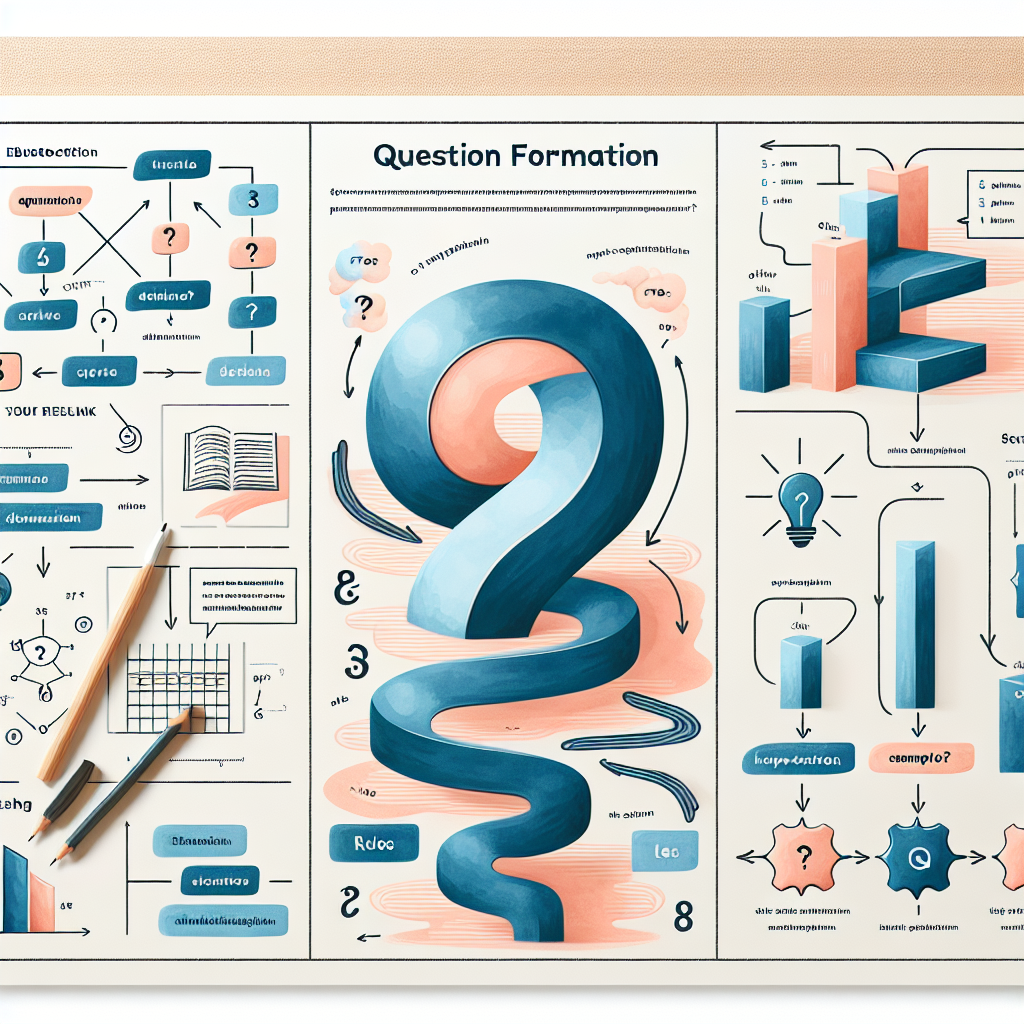Method of Question Formation in English Grammar

Method of Question Formation in English Grammar
1. Yes/No Questions (हाँ/ना वाले प्रश्न)
Yes/No Questions साधारण प्रश्न होते हैं जिनका उत्तर हाँ या ना में दिया जा सकता है।
Formula: Auxiliary Verb + Subject + Main Verb + Object?
Example:
- English: Is he coming?
- क्या वह आ रहा है?
- इज़ ही कमिंग?
- English: Are you hungry?
- क्या तुम भूखे हो?
- आर यू हंग्री?
Usage with “is”:
- English: Is the book on the table?
- क्या किताब मेज पर है?
- इज़ द बुक ऑन द टेबल?
Usage with “are”:
- English: Are they your friends?
- क्या वे तुम्हारे दोस्त हैं?
- आर दे योर फ्रेंड्स?
2. WH- Questions (व्ह– प्रश्न)
WH- Questions मे किसी विशेष जानकारी के लिए पूछे जाते हैं और यह WH- शब्दों (Who, What, When, Where, Why, How) से शुरू होते हैं।
Formula: WH- Word + Auxiliary Verb + Subject + Main Verb + Object?
Example:
- English: Where are you going?
- तुम कहाँ जा रहे हो?
- व्हेयर आर यू गोइंग?
- English: What is your name?
- तुम्हारा नाम क्या है?
- व्हाट इज़ योर नेम?
Question Types:
Who (कौन):
- English: Who is calling me?
- मुझे कौन बुला रहा है?
- हू इज़ कॉलिंग मी?
What (क्या):
- English: What are you doing?
- तुम क्या कर रहे हो?
- व्हाट आर यू डूइंग?
When (कब):
- English: When will you arrive?
- तुम कब आओगे?
- व्हेन विल यू अराइव?
Where (कहाँ):
- English: Where is my book?
- मेरी किताब कहाँ है?
- व्हेयर इज़ माय बुक?
Why (क्यों):
- English: Why are you late?
- तुम क्यों देर से आए हो?
- व्हाई आर यू लेट?
How (कैसे):
- English: How do you make this dish?
- तुम यह व्यंजन कैसे बनाते हो?
- हाउ डू यू मेक दिस डिश?
3. Tag Questions (टैग प्रश्न)
टैग प्रश्न बयान के अंत में लगाई जाती है, इस उम्मीद में कि दूसरी पार्टी उत्तर देगी।
Formula: Statement, Auxiliary Verb + Pronoun?
Example:
- English: You are coming, aren’t you?
- तुम आ रहे हो, हैं ना?
- यू आर कमिंग, आर्न’ट यू?
- English: She is beautiful, isn’t she?
- वह सुंदर है, है ना?
- शी इज़ ब्यूटीफुल, इज़न’ट शी?
Positive Statement + Negative Tag:
- English: They will come, won’t they?
- वे आएंगे, है ना?
- दे विल कम, वोन’ट दे?
Negative Statement + Positive Tag:
- English: You don’t like it, do you?
- तुम्हें यह पसंद नहीं है, है ना?
- यू डों’ट लाइक इट, डू यू?
4. Indirect Questions (अप्रत्यक्ष प्रश्न)
Indirect Questions अधिक विनम्र या औपचारिक होते हैं और सामान्यतः किसी वाक्य के हिस्सा बनते हैं। ये “if” या “whether” का प्रयोग करते हैं यदि उत्तर हाँ/ना में हो सकता है।
Formula: [Introductory Phrase] + WH- Word + Subject + Verb?
Example:
- English: Do you know where the station is?
- क्या आप जानते हैं कि स्टेशन कहाँ है?
- डू यू नो व्हेयर द स्टेशन इज़?
- English: Can you tell me what time it is?
- क्या आप मुझे बता सकते हैं कि समय क्या हुआ है?
- कैन यू टेल मी व्हाट टाइम इट इज़?
With Yes/No Type:
- English: Could you tell me if he is coming?
- क्या आप मुझे बता सकते हैं कि वह आ रहा है?
- कुड यू टेल मी इफ ही इज़ कमिंग?
- English: Do you know whether they finished the project?
- क्या आप जानते हैं कि उन्होंने परियोजना पूरी की या नहीं?
- डू यू नो वेदर दे फिनिश्ड द प्रोजेक्ट?
5. Choice Questions (विकल्प वाले प्रश्न)
Choice Questions विकल्प देते हैं और आम तौर पर “or” का प्रयोग करते हैं।
Formula: Auxiliary Verb + Subject + Main Verb + Object + Option A or Option B?
Example:
- English: Do you want tea or coffee?
- क्या आप चाय चाहते हैं या कॉफी?
- डू यू वांट टी ऑर कॉफी?
- English: Is he coming by car or bus?
- क्या वह कार से आ रहा है या बस से?
- इज़ ही कमिंग बाय कार ऑर बस?
इन उदाहरणों के माध्यम से Question Formation के विभिन्न प्रकारों को समझना आसान हो जाएगा, साथ ही इसके लिए उच्चारण भी देवनागरी में दिया गया है।

